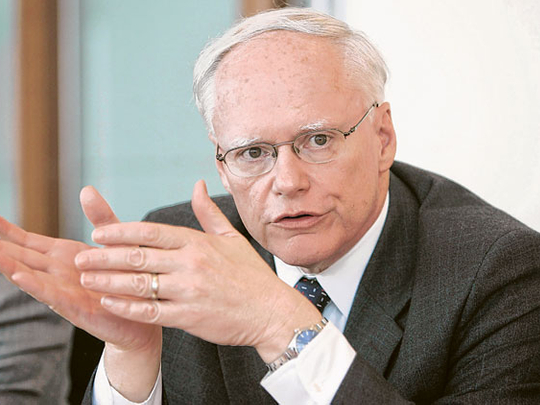
Dubai: Iraq remains the most democratic country in the Middle East and fears that the country will turn into a federation of autonomous regions are misplaced, believes James Jeffrey, the US ambassador to Iraq.
In an exclusive interview with Gulf News, Jeffrey also said that Iraq needs to have a liberal oil and gas law which clarifies many questions which international investors and companies are having so that they can come into Iraq and develop Iraq's oil sector.
Gulf News: Is the US still sponsoring the political process in Iraq, or has it been left to the different political blocs to deal with it?
James Jeffrey: Iraq is a sovereign democratic country. The US respects that and we have a relationship with Iraq which includes support of the democratic process according to a strategic framework agreement [Sofa] and within the framework of that understanding we provide certain programmes to support elections but beyond that we have no role as outsiders in the democratic process other than to observe and, if asked our opinion, we provide our opinion.
Is the US considering severing diplomatic ties with Syria? What will be the next step?
While we are considering closing our embassy in Syria we have no plans to sever diplomatic ties. We continue to work with the UN and the Arab League to seek a solution. We support the latest calls by the Arab League calling for a national unity government. I believe the Syrian government is taking the proposal seriously.
Former general David Petraeus and General Ray Odierno met up with Al Iraqiya leaders as the political crisis started in the country after the US army's withdrawal. What can you tell us about the meetings?
General Petraeus is the head of the Central Intelligence Agency and General Ray Odierno is the US army's Chief of Staff and as part of their normal contacts in the region they visit here and they visit any other country in the region. I wouldn't read anything special into that.
The Obama administration is proceeding with the sale to Iraq of almost $11 billion in weapons and training. Do you think that any assistance to Iraq's security forces ought to be conditional on the government's commitment to resolve its disagreements?
First of all, when we provide weapons we provide them with guarantees that they will be used for their proper purposes. The weapons given to the Iraqis are not for internal security, they are to be used to defend their borders and to eventually defend their air space and this is something any sovereign country needs and Iraq currently does not have. So this is something which is important for Iraq as a state and it has nothing to do with political conflicts.
Thousands of Iraqi and American lives were sacrificed in ridding Iraq of Saddam Hussain. A slide back to dictatorship, when much of the region is striving for democracy, would render their sacrifices meaningless. What are your thoughts in this regard?
We believe that Iraq remains the most democratic country in the Middle East. Obviously it faces very severe problems now and it is in the middle of a very difficult political controversy and we hope that it will be able to get out of it. We continue to support a united federalist, and democratic Iraq.
Senator John McCain said on the CBS television programme Face the Nation: "I think there's clearly an unravelling going on which could eventually lead basically into three different kinds of states in Iraq,". Do you believe Iraq will continue as a unified country?
Senator McCain is an expert on Iraq, he flies here much, we consult with him periodically and his views are to be taken seriously but they are his views. Once again our view is that while the country is facing a very serious political situation at present it will remain unified; it is our hope that it remains unified and it is our expectation that it will.
Defence secretary Leon Panetta earlier on the same CBS show expressed confidence that Iraqi forces were capable of dealing with the security threats and said "our people can be secure in what... they're doing there." How correct are Panetta's words following escalated violence and daily explosions around Baghdad?
We really regret these attacks and offer our condolences to the victims' families but secretary Panetta's remarks are absolutely correct. We have looked at the actual statistics of the attacks and the casualties. Generally over the past 4 or 5 years we see that violence continues to go down. Iraq is safer today than two years ago, even a year ago.
It seems that whenever there is a political crisis in the country there is an escalation in attacks. What is your view?
I disagree. These attacks are not a result of the political crisis as they are planned months in advance; they are very carefully put together by Al Qaida.
Approving an oil and gas law in the country has been postponed for a very long time, and whenever a semblance of an agreement is seen on the horizon, something happens and the bill is pushed aside. What are your thoughts about this?
We think that it is very important for two reasons to move forward on that bill and the US has been advocating that since 2007. First of all we need to have a liberal law which clarifies many questions which international investors and companies are having so that they can come into Iraq and develop their oil sector. Secondly this is the bone of contention between the central government and the Kurdish regional government and as we are in favour of the best political relations between all Iraqi axis — we think it would be good to resolve that.












